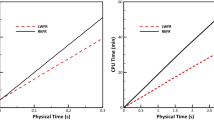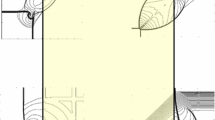Abstract
In this paper, two flux-only least-squares finite element methods (LSFEM) for the linear hyperbolic transport problem are developed. The transport equation often has discontinuous solutions and discontinuous inflow boundary conditions, but with continuous normal component of the flux across the mesh interfaces. Continuous finite element spaces are used to approximate the solution in traditional LSFEMs. This will introduce unnecessary error and serious overshooting. In Liu and Zhang (Comput Methods Appl Mech Eng 366:113041, 2020), we reformulate the equation by introducing a new flux variable to separate the continuity requirements of the flux and the solution. Realizing that the Raviart-Thomas mixed element space has enough degrees of freedom to approximate both the flux and its divergence, we eliminate the solution from the system and get two flux-only formulations, and develop corresponding LSFEMs. The solution then is recovered by simple post-processing methods using its relation with the flux. These two versions of flux-only LSFEMs use less DOFs than the method we developed in Liu and Zhang (2020). Similar to the LSFEM developed in Liu and Zhang (2020), both flux-only LSFEMs can handle discontinuous solutions better than the traditional continuous polynomial approximations. We show the existence, uniqueness, a priori and a posteriori error estimates of the proposed methods. With adaptive mesh refinements driven by the least-squares a posteriori error estimators, the solution can be accurately approximated even when the mesh is not aligned with discontinuity. The overshooting phenomenon is very mild if a piecewise constant reconstruction of the solution is used. Extensive numerical tests are done to show the effectiveness of the methods developed in the paper.


















Similar content being viewed by others
References
Bochev, P.B., Choi, J.: A comparative study of least-squares, SUPG and Galerkin methods for convection problems. Int. J. Comput. Fluid Dyn. 15, 127–146 (2001)
Bochev, P.B., Choi, J.: Improved least-squares error estimates for scalar hyperbolic problems. Comput. Methods Appl. Math. 1, 115–124 (2001)
Bochev, P.B., Gunzburger, M.D.: Least-Squares Finite Element Methods, Applied Mathematical Sciences, vol. 166. Springer, Berlin (2009)
Bochev, P.B., Gunzburger, M.D.: Least-squares methods for hyperbolic problems. In: Abgrall, R., Shu, C.-W. (eds.) Handbook of Numerical Analysis, Handbook of Numerical Methods for Hyperbolic Problems: Basic and Fundamental Issues, ch. 12, vol. 17, pp. 289–317. Elsevier, Amsterdam (2016)
Boffi, D., Brezzi, F., Fortin, M.: Mixed Finite Element Methods and Applications, no. 44 in Springer Series in Computational Mathematics. Springer, Berlin (2013)
Carey, G.F., Jiang, B.-N.: Least-squares finite elements for first-order hyperbolic systems. Int. J. Numer. Methods Eng. 26, 81–93 (1988)
Chen, H., Fu, G., Li, J., Qiu, W.: First order least squares method with weakly imposed boundary condition for convection dominated diffusion problems. Comput. Math. Appl. 68, 1635–1652 (2014)
Chen, H., Li, J., Qiu, W.: Robust a posteriori error estimates for hdg method for convection–diffusion equations. IMA J. Numer. Anal. 36, 437–462 (2016)
Dahmen, W., Huang, C., Schwab, C., Welper, G.: Adaptive Petrov-Galerkin methods for first order transport equations. SIAM J. Numer. Anal. 50, 2420–2445 (2012)
De Sterck, H., Manteuffel, T.A., McCormick, S.F., Olson, L.: Least-squares finite element methods and algebraic multigrid solvers for linear hyperbolic pdes. SIAM J. Sci. Compt. 26, 31–54 (2004)
Di Pietro, D., Ern, A.: Mathematical Aspects of Discontinuous Galerkin Methods. Springer, Berlin (2012)
Fu, G., Qiu, W., Zhang, W.: An analysis of hdg methods for convection-dominated diffusion problems. ESAIM Math. Model. Numer. Anal. 49, 225–256 (2015)
Guermond, J.-L.: A finite element technique for solving first order PDE’s in \(L^p\). SIAM J. Numer. Anal. 47, 714–737 (2004)
Hughes, J., Franca, L., Hulbert, G.: A new finite element formulation for computational fluid dynamics: VIII. The Galerkin/least-squares method for advective-diffusive equations. Comput. Methods Appl. Mech. Eng. 73, 173–189 (1988)
Jiang, B.-N.: The Least-Squares Finite Element Method Theory and Applications in, Scientifc ComputationComputational Fluid Dynamics and Electromagnetics. Springer, Berlin (1998)
Liu, Q., Zhang, S.: Adaptive least-squares finite element methods for linear transport equations based on an H(div) flux reformulation. Comput. Methods Appl. Mech. Eng. 366, 113041 (2020)
Mu, L., Ye, X.: A simple finite element method for linear hyperbolic problems. J. Comput. Appl. Math. 330, 330–339 (2018)
Peterson, T.E.: A note on the convergence of the discontinuous Galerkin method for a scalar hyperbolic equation. SIAM J. Numer. Anal. 28, 133–140 (1991)
Qiu, W., Shi, K.: An HDG method for convection diffusion equation. J. Sci. Comput. 66, 346–357 (2016)
Qiu, W., Zhang, S.: Adaptive first-order system least-squares finite element methods for second order elliptic equations in non-divergence form (2019). arXiv:1906.11436
Zhang, S.: On approximating discontinuous solutions of PDEs by adaptive finite elements (2019). arXiv:1907.03429 [math.NA]
Author information
Authors and Affiliations
Corresponding author
Additional information
Publisher's Note
Springer Nature remains neutral with regard to jurisdictional claims in published maps and institutional affiliations.
This work was supported in part by Hong Kong Research Grants Council under the GRF Grant Project No. CityU 11305319 and a China Sichuan Provincial Science and Technology Research Grant 2018JY0187 via Chengdu Research Institute of City University of Hong Kong.
Rights and permissions
About this article
Cite this article
Liu, Q., Zhang, S. Adaptive Flux-Only Least-Squares Finite Element Methods for Linear Transport Equations. J Sci Comput 84, 26 (2020). https://doi.org/10.1007/s10915-020-01269-y
Received:
Revised:
Accepted:
Published:
DOI: https://doi.org/10.1007/s10915-020-01269-y




